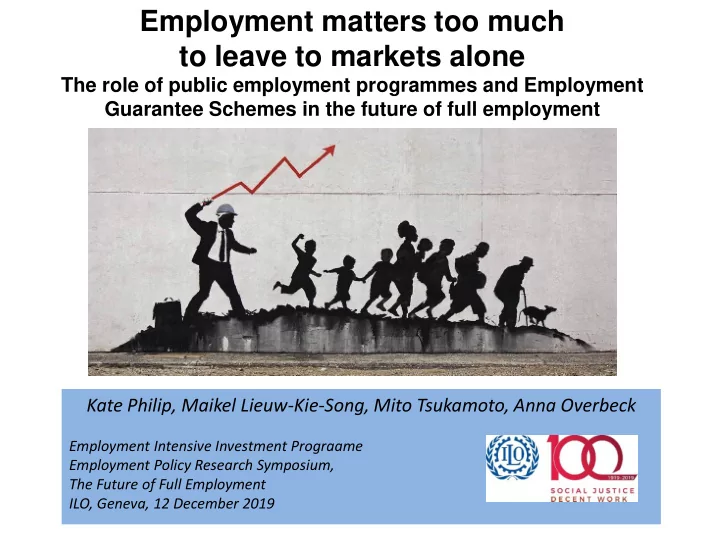

Employment matters too much to leave to markets alone The role of public employment programmes and Employment Guarantee Schemes in the future of full employment Kate Philip, Maikel Lieuw-Kie-Song, Mito Tsukamoto, Anna Overbeck Employment Intensive Investment Prograame Employment Policy Research Symposium, The Future of Full Employment ILO, Geneva, 12 December 2019
What are they? • Public Employment Programme: a range of interventions, publically financed which share the primary objective of creating ‘state -sponsored employment for working age poor who are unable to support themselves due to the inadequacy of market- based employment opportunities. PEPs usually produce assets or services that create public value and contribute to the public good, but is outside the normal public service. • Employment Guarantee Schemes (EGS) – programmes which guarantee state sponsored employment to all those seeking it. (PEP that offer a guarantee. Right to work)
What is their role? Plan A Macro policy Industrial policy Plan B Development finance For when the market response still falls short in Public investment delivering full employment: Labour market policy Deliver on Social ALMPs, incentives Contract through orms And more of direct employment (PEPS) / employment All of the above enable guarantees / the state as and/or shape employer of last resort market-based employment outcomes
Are they affordable? MGNREGA in India: • Under the Mahatma Gandhi National Rural Employment Guarantee Act, the state guarantees every rural household up to 100 days of work per annum, as needed. • It’s a right. Over 60 million people participate annually . Full Employment Guarantee
Are they affordable? MGNREGA in India: Guarantee only in Rural Areas
Are they affordable? MGNREGA in India: Guarantee in rural areas but to households instead of individuals
Are they affordable? MGNREGA in India: Cost of a 100 days per year guarantee for households in rural areas • Costs are manageable- by design- EGS far from a blank check! (But any of these parameters can be relaxed if you want a fuller guarantee) • Realities of implementation: actual taken up-50 million • Result: actual cost: around 0.5% of GDP
Why not Universal Income instead of Full Employment? Income security matters. Whether through UBI or other social protection measures. But few people want to rely on minimum incomes all their working life. UBI/Jobs Guarantee: Not a binary choice: Scope for synergies and complementarities 8
Full Employment…because: Social value of work Work is not just a means for distributing purchasing power. It is also among the most important sources of identity and purpose in individual’s lives. If the role of work in society is to shrink , other sources of purpose and identity will need to grow . (Avent, 2016)
What is our recent experiences? • Set a labour standards floor (India) • Provide pathways out of informality (South Africa) • Contribute to paid work in the care economy (South Africa, Egypt) • Respond to migration and displacement (Jordan) • Provide activation and transitionas an ALMP (Greece, South Korea) • Reach higher skilled workers, not just the unskilled/ poorest (Greece, South Korea) While versatile and common: Experience on some issues limited, unintended consequences to be managed and evidence sometimes still thin- much more to learn
But what will people do? There’s work to be done to (re) build the commons: Experiment with new forms of work AND reassess how we place a value on work
Employment matters too much to leave to markets alone What we need now is experimentation and innovation in the strengthened use of this EGS/PEPs as a policy instrument: – To end involuntary unemployment and underemployment – not as a crisis response but as an institutionalised, counter-cyclical part of the labour market – To use PEPs to set a labour standards floor – giving people alternatives. – To design integrated approaches that synergise with minimum incomes and other social protection polices – To identify new forms of public value creation – through new forms of work – To use for PEPs to strengthen the commons and create new forms of social engagement in strengthening communities.
Recommend
More recommend